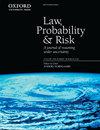论传统与衡平法的保护
IF 2.7
4区 社会学
Q1 LAW
引用次数: 0
摘要
本文探讨的问题是,传统的规范性是否使我们有理由(或多或少)以其历史形式保留衡平法规范,即与邻近的普通法教义分开。本文的主要目标是呼吁用其他可能更成功的手段来取代股权,以实现股权设定的目标。它首先表明,即使是自由主义,进步主义和理性主义的人也应该把传统看作是对我们的规范性要求,因为传统可以潜在地拥有工具和非工具价值,这些价值超越了他们所坚持的信仰,仪式或行为形式的内容。第二部分探讨衡平法作为一种法律传统是否体现了这种价值。我发现,我们在公平中发现的法律和道德传统的独特结合使它具有作为社会凝聚力的代理人、协调的工具和宝贵的专门知识的来源的巨大价值。我引用了两个具体的例子来替代衡平法——大陆滥用权利原则和诚信原则——我认为,衡平法长期以来一直是我们在这里做事的方式,这一事实使它成为一个更好的改革平台,而不是从外国系统中植入或新设计的一套规范。如果要改革,就应该以公平为出发点,而不是一笔勾销、从零开始。本文章由计算机程序翻译,如有差异,请以英文原文为准。
On Tradition and the Conservation of Equity
This paper explores the question whether the normativity of tradition gives us reasons to preserve the norms of equity (more or less) in their historical form, i.e., as separate from neighboring common law doctrines. The main target of the paper are arguments that call for the replacement of equity with other, arguably more successful, means for attaining the goals equity sets to achieve. It begins by showing that even liberal, progressive and rationalist people should see traditions as making a normative claim on us, as they can potentially possess both instrumental and non-instrumental value that goes over and above the content of the beliefs, rituals or forms of action which they uphold. The second part asks whether equity qua legal tradition exemplifies such value. I find that the unique combination of legal and moral tradition that we find in equity endows it with a great value as an agent for social cohesion, an instrument of coordination and a source of invaluable know-how knowledge. With reference to two concrete examples of alternatives to equity—the continental doctrine of abuse of rights and a good faith principle—I argue that the fact that equity has been the way we do things around here for so long makes it a better platform for reform than an implant from foreign system or a newly devised set of norms. If reform is needed, we should take equity as its starting point rather than wiping the slate clean and starting from scratch.
求助全文
通过发布文献求助,成功后即可免费获取论文全文。
去求助
来源期刊

Law Probability & Risk
MATHEMATICSSTATISTICS & PROBABILITY&-STATISTICS & PROBABILITY
CiteScore
2.10
自引率
28.60%
发文量
8
期刊介绍:
Law, Probability & Risk is a fully refereed journal which publishes papers dealing with topics on the interface of law and probabilistic reasoning. These are interpreted broadly to include aspects relevant to the interpretation of scientific evidence, the assessment of uncertainty and the assessment of risk. The readership includes academic lawyers, mathematicians, statisticians and social scientists with interests in quantitative reasoning.
The primary objective of the journal is to cover issues in law, which have a scientific element, with an emphasis on statistical and probabilistic issues and the assessment of risk.
Examples of topics which may be covered include communications law, computers and the law, environmental law, law and medicine, regulatory law for science and technology, identification problems (such as DNA but including other materials), sampling issues (drugs, computer pornography, fraud), offender profiling, credit scoring, risk assessment, the role of statistics and probability in drafting legislation, the assessment of competing theories of evidence (possibly with a view to forming an optimal combination of them). In addition, a whole new area is emerging in the application of computers to medicine and other safety-critical areas. New legislation is required to define the responsibility of computer experts who develop software for tackling these safety-critical problems.
 求助内容:
求助内容: 应助结果提醒方式:
应助结果提醒方式:


